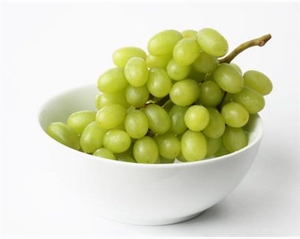A new study in Journal of Cell Communication and Signaling suggests taking grape seed extract may help people with metabolic syndrome or specifically insulin resistance, a metabolic symptom found in people with diabetes or pre-diabetes.
Journal of Cell Communication and Signaling suggests taking grape seed extract may help people with metabolic syndrome or specifically insulin resistance, a metabolic symptom found in people with diabetes or pre-diabetes.
The study led by B Y ogalakshmi from Annamalai University, in Annamalai Nagar, Tamil Nadu, India and colleagues shows grape seed proanthocyanidins (GSP) and metformin (Met) promote insulin signaling in rats on a high fat, high fructose diet via different mechanisms.
For the study, Albino Wistar rats were fed a high fat, high fructose diet to induce insulin resistance in the animals. (Note how nasty a high fat high fructose diet is!) And then either GSP in a dose of 100 mg/kg body weight, or metformin in a dose of 50 mg/kg body weight or both were administered to insulin resistant rats.
As a result, the high fat, high fructose diet caused hyperglycemia (high sugar), hyperinsulinemia (high insulin), increased gluconeogenesis (a metabolic process resulting in the generation of glucose from noncarbohydrate carbon substrates). The diet also caused other unfavorable metabolic changes in the rats.
It was also found that both grape seed proanthocyanidins (GSP) and metformin (MET ) reduced hyperglycemia and hyperinsulinemia and improved affected metabolic changes. In comparison, grape seed proanthocyanidins more effectively than metformin reversed the unfavorable physiological changes induced by chronic use of the high fat high fructose diet.
The researchers found both grape seed proanthocyanidins (GSP) and metformin (MET ) help the insulin resistant rats via different metabolic pathways and suggested use of grape seed proanthocyanidins (GSP) can enhance the efficacy of metformin in treatment of metabolic syndrome.
The study also indicated that a high fat, high fructose diet can cause insulin resistance, a precursor to type 2 diabetes mellitus. High fat and high fructose are typical dietary components in the Western diet. High fructose corn syrup (now called corn sugar by the industry) and cane sugar are two major sources for fructose.
Glucose which is also found in high fructose corn syrup and cane or beet sugar is more friendly than fructose. T hose who want to reduce their risk for insulin resistance may consider use of glucose or maltose (two units of glucose per molecule). T hose who can't avoid fructose corn syrup or saturated and trans fat, may consider taking a grape seed extract from time to time because of its potential to help you prevent the metabolic symptom.
To prevent insulin resistance or type 2 diabetes mellitus, one may also try cucurmin in a dose of 6 grams per day and cinnamon which research has found is effective in helping prevent the development of diabetes type 2. (DL)
 Journal of Cell Communication and Signaling suggests taking grape seed extract may help people with metabolic syndrome or specifically insulin resistance, a metabolic symptom found in people with diabetes or pre-diabetes.
Journal of Cell Communication and Signaling suggests taking grape seed extract may help people with metabolic syndrome or specifically insulin resistance, a metabolic symptom found in people with diabetes or pre-diabetes.The study led by B Y ogalakshmi from Annamalai University, in Annamalai Nagar, Tamil Nadu, India and colleagues shows grape seed proanthocyanidins (GSP) and metformin (Met) promote insulin signaling in rats on a high fat, high fructose diet via different mechanisms.
For the study, Albino Wistar rats were fed a high fat, high fructose diet to induce insulin resistance in the animals. (Note how nasty a high fat high fructose diet is!) And then either GSP in a dose of 100 mg/kg body weight, or metformin in a dose of 50 mg/kg body weight or both were administered to insulin resistant rats.
As a result, the high fat, high fructose diet caused hyperglycemia (high sugar), hyperinsulinemia (high insulin), increased gluconeogenesis (a metabolic process resulting in the generation of glucose from noncarbohydrate carbon substrates). The diet also caused other unfavorable metabolic changes in the rats.
It was also found that both grape seed proanthocyanidins (GSP) and metformin (MET ) reduced hyperglycemia and hyperinsulinemia and improved affected metabolic changes. In comparison, grape seed proanthocyanidins more effectively than metformin reversed the unfavorable physiological changes induced by chronic use of the high fat high fructose diet.
The researchers found both grape seed proanthocyanidins (GSP) and metformin (MET ) help the insulin resistant rats via different metabolic pathways and suggested use of grape seed proanthocyanidins (GSP) can enhance the efficacy of metformin in treatment of metabolic syndrome.
The study also indicated that a high fat, high fructose diet can cause insulin resistance, a precursor to type 2 diabetes mellitus. High fat and high fructose are typical dietary components in the Western diet. High fructose corn syrup (now called corn sugar by the industry) and cane sugar are two major sources for fructose.
Glucose which is also found in high fructose corn syrup and cane or beet sugar is more friendly than fructose. T hose who want to reduce their risk for insulin resistance may consider use of glucose or maltose (two units of glucose per molecule). T hose who can't avoid fructose corn syrup or saturated and trans fat, may consider taking a grape seed extract from time to time because of its potential to help you prevent the metabolic symptom.
To prevent insulin resistance or type 2 diabetes mellitus, one may also try cucurmin in a dose of 6 grams per day and cinnamon which research has found is effective in helping prevent the development of diabetes type 2. (DL)





